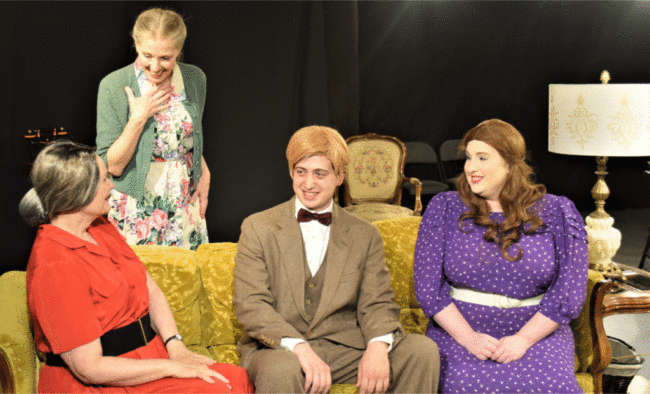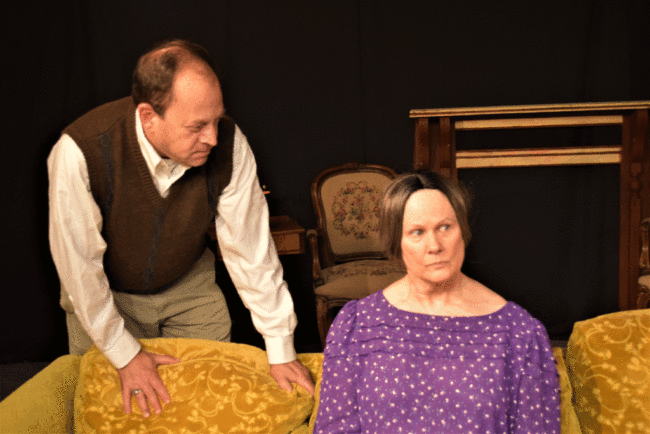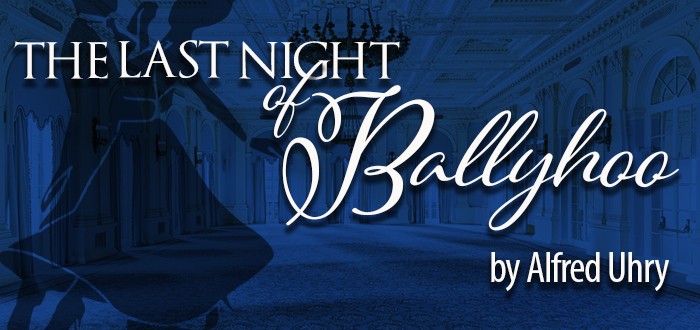As I watched The Last Night of Ballyhoo, written by Alfred Uhry and directed by Ilene Chalmers, at the Bowie Community Theatre, I had a thought somewhere during Act I, Scene 4: “This play really is about something.” This is not to say that I disliked the production before that; even before coming to that revelation I would have acknowledged the stellar set and the faultless performances from the cast. This production, however — which follows a Jewish family in 1939 Atlanta, Georgia — has very much the flavor of a sitcom, with a cast of somewhat quirky characters and humorous, if seemingly trivial, scenarios to navigate. (Per the title, the “primary” conflict here involves whether the younger female characters will attend Ballyhoo, an annual Jewish ball, and particularly whether one of them will be asked to the dance by a wealthy young man of her acquaintance.) But once the play began to touch on more difficult subject matter even as it retained its overall tone, it began to seem to me more like a Very Special Episode of a sitcom, albeit without the excessive sententiousness that often accompanies those stories. There’s lots here to make audiences laugh, but there’s also ample food for thought.

As community theatre groups go, the Bowie Community Theatre never fails to impress in terms of production values. Set designers Gene Valendo and Sascha Nelson, set construction supervisor Ken Kienas, and the entire set construction and painting crews deserve major credit here, because the set legitimately looks like the interior of a house. I reviewed another BCT production where the set was also a gorgeous home interior, and that one had a glimpse of stairs leading to a second level of the home — but Ballyhoo one-ups that by actually having the stairwell fully visible! While that detail is admittedly fairly meaningless in terms of the story, it really does help to sell the illusion, and it does make one of the funnier sequences in the show that much more so. That sequence, by the way, would hardly work so well without the excellent costume design from Linda Swann, which manages to be both unobtrusive and remarkable. With the exception of the ball outfits, which are appropriately eye-catching, the costumes generally succeed at seeming appropriate without being distracting — and yet there are frequent outfit changes and subtle costuming payoffs (one character spends the show knitting; towards the end another character actually dons the sweater she’d been crafting) that make it clear just how much thought was put into clothing the Ballyhoo cast. (Kudos to stage manager Sally Dodson here as well. In addition to her other duties, coordinating the abundant costume changes seems like a noteworthy feat!)
But even the most gorgeous sets and lavish costumes cannot themselves carry a play, and here the actors are so fantastic that they consistently outshine the impressive construction of their backdrop. From the opening moments of the play, Jeanne Louise and Jean Berard — as Reba Freitag and Boo Levy, respectively — establish a dynamic that embodies all the characteristics of longstanding familiarity: they seamlessly navigate the cordiality and hostilities and trivialities that characterize such enduring relationships, and it all feels natural because even their disputes are absent of true malice and always infused with an undercurrent of genuine affection. As the paternalistic Adolph Freitag, Glenn Singer further augments and enriches that family dynamic; while he generally serves as a foil for and mediator between the two elder ladies, he is afforded several reflective moments that contextualize his inclination to provide for his sisters and nieces and earn him well-deserved sympathy from the audience.
And even though LaLa Levy is the butt of many of the play’s jokes — the other characters spend much of the play lamenting her shortcomings, whereupon LaLa bursts onto the scene and confirms their comments in decidedly farcical fashion — Spencer Kate Nelson is delightful in the role. Moreover, though it is exceedingly difficult to take LaLa seriously, Nelson imbues the character with an artless effervescence that makes her impossible to root against. In that vein, Michael Safko’s Peachy Weil is, well, something else entirely! Peachy is the kind of obnoxious sitcom character whose every antic would be punctuated with canned laughter when perhaps groans would be more appropriate, but Safko plays the character to cringeworthy perfection — particularly given that his character is the representative for some of the more reprehensible attitudes in the play.
In the company of these often outsized personalities, the characters of Sunny Freitag and Joe Farkas, respectively played by Robin Schwartz and Andrew Rappa, come across somewhat more like special guest stars in this Very Special Episode. Yet, as that is their function — and as they actually are visitors in the script — they nevertheless feel essential to the proceedings. It is primarily their romantic subplot that adds true significance to the play, and in the midst of the humorous hullabaloo surrounding Ballyhoo their exchanges feel substantive and sincere.

I admit that, even having read several synopses of the play (though avoiding more comprehensive commentaries), The Last Night of Ballyhoo was not quite what I was expecting. Given other events taking place in the world of 1939 and the production’s focus on even an American Jewish family, I was anticipating a much grimmer production, so it was a little jarring to find myself watching what, at least initially, seemed to be a fairly standard sitcom. Granted, sitcoms derive their strength from their relatable nature, and there is absolutely value in a work that exists solely to affect the audience on those grounds: I saw the production with a Jewish friend, and she was particularly moved by the reflections of her own life and family members that she witnessed in the characters. As a Gentile, I was less capable of appreciating the more culturally authentic aspects of the characters (even as I was able to find amusement in their quirks), but even aspects of their discussions did not seem so foreign (like this production’s assimilated Jews, I am a non-Christian who has no problem embracing the Christmas tree as a secular American tradition). Moreover, the less humorous conflicts in the production — the discrimination that certain characters described encountering; the negative views that certain Jewish groups held concerning even other Jews; the conflicting attitudes about the obligations of one’s identity — provide the characters and the play as a whole with a substantive ballast to the prevalent and genuinely enjoyable moments of levity. Even if one can’t entirely relate to the more unfortunate realities of Jewish life, these issues are absolutely worth pondering — and one could certainly find worse prompting than the otherwise charming antics of the Freitags and Levys on the eve of Ballyhoo.
Running Time: Approximately 2 hours and 15 minutes with one intermission.
The Last Night at Ballyhoo plays through October 27, 2019 with Bowie Community Theatre at the Bowie Playhouse in White Marsh Park— 16500 White Marsh Park Drive in Bowie, MD. For tickets please call the box office at (301) 805-0219 or purchase them online.

